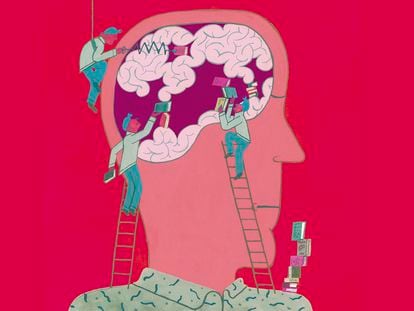The ubiquitous term “mental health” refers to two different phenomena, with different causes and implications.
First, there is the problem of the tremendous struggle of individuals and families affected by a severe mental disorder (schizophrenia, bipolar disorder, OCD, autism, recurrent major depression, anorexia, etc.) to lead a fulfilling life.
These diseases, sometimes so disabling, are the result of a complex interaction of biological and psychosocial factors, and our duty is to facilitate patients' access to empirically validated treatments and all social assistance that facilitates their full integration into the community.
It is an expensive action, but fair;
if money has to be spent, it should go there.
More information
Self-help books: the tricky use of science to defend common sense
The second problem is psychological discomfort, frustration, exhaustion, dissatisfaction with life..., which is sometimes expressed as symptoms of anxiety and depression, insomnia, inability to work or overwhelmed by the multiple adversities of life ( so-called adjustment disorders).
Various approaches have been proposed and discussed for this evil of our time, this epidemic of dissatisfaction, which we review almost telegraphically:
1. The psychopharmacology of malaise
It is used massively, we can affirm that, since the publication of the book, Prozac has definitively defeated Plato.
There is a clear upward trend in the consumption of psychoactive drugs, reaching a total of 4.2 million monthly antidepressant treatments in Spain.
When taken without a clear medical indication, it is a kind of
psychocosmetics
of questionable benefit.
It's certainly a quick, low-cost solution that doesn't require much commitment from the subject or the environment, but it's clearly an insufficient temporary patch to unresolved problems.
The bad thing is when this perverse use of drugs, this medicalization of human suffering, generates an indiscriminate anti-medication discourse, which confuses those people who do need it or could benefit from it.
We psychiatrists see this on a daily basis.
2. Psychotherapy for everyone
Promoted by the
boom
of the visibility of mental health problems and the "I also go to therapy", opens an impressive private market, in the heat of the collapse of public mental health centers.
It is a beneficial option for many, there is no doubt.
The intimate, non-transferable encounter with the therapist can enable accompaniment, self-knowledge and change, I will not be the one who criticizes it.
But, the solution to this universal malaise is to have an army of therapists?
An extraordinarily successful alternative is reading psychological and self-help texts, focused on coping with stress, emotional regulation, and psychoeducation.
Some are great, they convey great optimism and at times their reading suggests that everything really depends on how we see things.
But its effect does not usually last long.
3. Socialize (and politicize) individual suffering
The idea, initially, is reasonable: the way out of a widespread problem should not be based on individual responsibility, but rather by acting collectively on the social determinants of mental health: income inequalities, working conditions, discrimination... Along these lines is the report commissioned by the Government on job insecurity and mental health or the consideration of depression as a political entity by Mark Fisher (disseminated by Íñigo Errejón or Eduardo Madina).
If we lead a more prosperous and comfortable life, our mental health is supposed to improve.
It makes sense, but there are also two problems, or risks: that then each political option (left or right) talks about wanting to "improve the mental health" of citizens and the concept becomes a mere ideological decoy.
Because it is assumed that the different political options —even if they are not ours—, aspire to the common good and prosperity, some with some policies and others with others (believing otherwise would denote a certain fanaticism).
The second pitfall is that psychological distress does not always correlate linearly with levels of poverty and adversity.
The pockets of boredom of our time sometimes occur in wealthy neighborhoods of Paris, New York or Berlin..., not in Bangladesh or Nairobi, which seem to have more reasons.
The mental health crisis did not break out after the devastating world wars or in Mao Tse Tung's great Chinese famine, but it has done so in our current moment, in which there is instability, precariousness and everything can be improved, yes, but in in which extreme poverty has been reduced by a third between 1999 and 2019. In summary,
Psychic discomfort is sometimes expressed as symptoms of anxiety and depression in the face of the multiple adversities of life, they are adaptive disorders
All the dimensions of mental health are important and not exclusive, but perhaps it is necessary to broaden the frame and analyze how we live and for what purpose, ask ourselves questions that increase our existential perspective.
In the age of increasing adolescent suicide attempts, rescuing Viktor Frankl and simply asking ourselves: why live?
(“Whoever has a why to live, he will almost always find the how”).
Read Byung-Chul Han to try to understand this "fatigue society", a product of narcissism, multitasking
and
the tyranny of positivity, or, in our midst, Javier Gomá or Jorge Freire, who —among others— have addressed the necessary construction of a significant sense, which makes it possible to tolerate adversity.
Says the latter in his phenomenal essay
Agitation
(Foam Pages, 2020): "For suffering to cease, it is necessary to stop escaping from pain."
Addressing this complex crisis at the hands of Montaigne, Albert Camus, Martin Buber and many other thinkers who defended that the main function of philosophy is to teach us how to live.
And, finally, perhaps it is necessary to address the dimension of the human being that has been practically forgotten or turned into a taboo by recent psychology: the spiritual.
The decline of institutional religion in the West generated a huge sinkhole in the human being's desire for meaning, temporarily filled in the 20th century by the great ideological systems and nationalisms (through the
Nostalgia for the Absolute
, which George Steiner described).
But now, in our hectic secular and postmodern world, how do we channel our natural desire for transcendence, for belonging to something bigger than ourselves? How do we give meaning to the losses and suffering inherent in life?
You can follow
MATERIA
on
,
and
, or sign up here to receive
our weekly newsletter
.







/cloudfront-eu-central-1.images.arcpublishing.com/prisa/YLHX6S52PZFI7JXMGDS7SQKAVQ.jpg)

/cloudfront-eu-central-1.images.arcpublishing.com/prisa/R7LE6KKQC5HW5DNNUAN62ZIWZY.jpg)